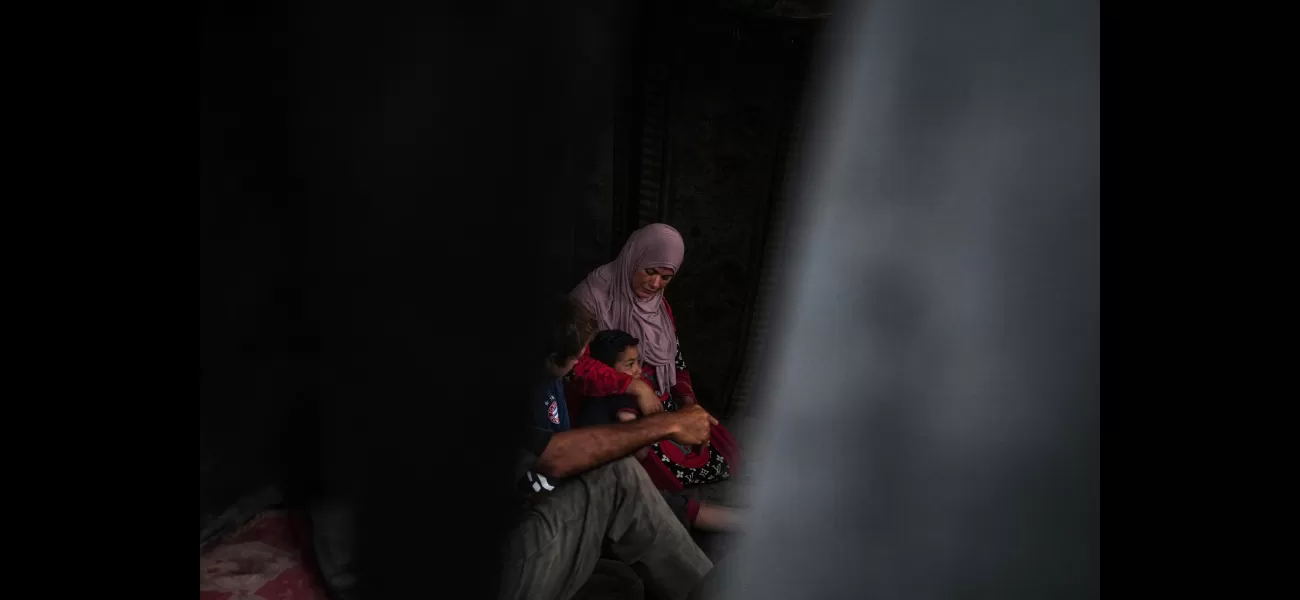Muslim holiday in Gaza a somber reminder of the devastating effects of war on families.
Palestinians in Gaza unable to celebrate Eid al-Adha properly this year due to ongoing war, forced to eat canned food in hot tents.
June 15th 2024.

In Deir al-Balah, a town in the Gaza Strip, the summer of last year was filled with joy and celebration as Palestinians came together to mark the Muslim holiday of Eid al-Adha. It was a time for feasting with loved ones, sharing meat with those in need, and giving gifts and new clothes to children. However, this year, things are starkly different. After eight months of devastating war between Israel and Hamas, the holiday spirit has been replaced with despair and hardship. Many families are forced to eat canned food in cramped tents, with little to no meat or livestock available in local markets. The ongoing conflict has left them with no money for holiday treats or presents, only war, hunger, and misery with no end in sight.
Nadia Hamouda, a mother who lost her daughter in the war and was forced to flee her home in northern Gaza, shares the heartbreaking sentiment of many others in her situation. She says, "There is no Eid this year." Instead of the joyful celebrations of the past, the call to prayer now brings tears for those who have been lost and the way of life that has been destroyed. Muslims all over the world will be celebrating Eid al-Adha, a four-day festival commemorating the Prophet Ibrahim's willingness to sacrifice his son, early this week. But for the people of Gaza, this year's celebration will be far from the usual.
Even before the war, Gaza was already facing poverty and isolation. However, the people still found ways to celebrate the holiday, decorating their homes, surprising children with gifts, and sharing meat with those less fortunate. Hamouda recalls, "It was a real Eid. Everyone was happy, including the children." But now, with most of the population of 2.3 million Palestinians displaced and their homes in ruins, there is little to celebrate. The war has also destroyed much of the agriculture and food production in Gaza, leaving people dependent on humanitarian aid that is hindered by Israeli restrictions and the ongoing fighting. The result is a dire situation where over a million people are at risk of starvation.
Adding to the difficulties, the closure of the Rafah crossing by Egypt has cut off the only route for people to enter or leave Gaza. This means that Palestinians will not be able to make the annual Hajj pilgrimage that precedes Eid. Ashraf Sahwiel, who was among the hundreds of thousands who fled Gaza City during the war and is now living in a tent, has no idea when he will be able to return home. "We don't even know what happened to our houses or whether we'll be able to live in them again, or if it's even possible to rebuild," he says.
The war has also had a devastating effect on the local economy. Abdelsattar al-Batsh, a father of seven, says his family has not been able to afford meat since the war began. The cost of a kilogram of meat has risen to 200 shekels, while a live sheep that used to cost $200 now costs $1,300, if it is even available. He laments, "Today, there is only war. No money. No work. Our houses have been destroyed. I have nothing."
The shortage of livestock and feed due to Israel's blockade has also resulted in a surge in prices, according to Iyad al-Bayouk, a cattle farmer in southern Gaza. Some farms have even been converted into shelters for those who have lost their homes. Mohammed Abdel Rahim, who has been sheltering in a building on an empty cattle farm, describes the dire conditions. "In the winter, it smelled like animals and was infested with bugs. But as the heat set in, it became more bearable," he says.
Abdelkarim Motawq, another displaced Palestinian from northern Gaza, used to work in the local meat industry, which would have been bustling during the holiday season. However, this year, his family can only afford rice and beans. He says, "I wish I could work again. It was a busy season for me, during which I would bring money home and buy food, clothing, nuts, and meat for my children. But today there's nothing left."
It is a dire and heartbreaking situation for the people of Gaza, who have been caught in the crossfire of a devastating war. As Khaled reports from Cairo, the holiday season that is meant to bring joy and celebration now only brings tears and suffering for the Palestinians in Gaza.
Nadia Hamouda, a mother who lost her daughter in the war and was forced to flee her home in northern Gaza, shares the heartbreaking sentiment of many others in her situation. She says, "There is no Eid this year." Instead of the joyful celebrations of the past, the call to prayer now brings tears for those who have been lost and the way of life that has been destroyed. Muslims all over the world will be celebrating Eid al-Adha, a four-day festival commemorating the Prophet Ibrahim's willingness to sacrifice his son, early this week. But for the people of Gaza, this year's celebration will be far from the usual.
Even before the war, Gaza was already facing poverty and isolation. However, the people still found ways to celebrate the holiday, decorating their homes, surprising children with gifts, and sharing meat with those less fortunate. Hamouda recalls, "It was a real Eid. Everyone was happy, including the children." But now, with most of the population of 2.3 million Palestinians displaced and their homes in ruins, there is little to celebrate. The war has also destroyed much of the agriculture and food production in Gaza, leaving people dependent on humanitarian aid that is hindered by Israeli restrictions and the ongoing fighting. The result is a dire situation where over a million people are at risk of starvation.
Adding to the difficulties, the closure of the Rafah crossing by Egypt has cut off the only route for people to enter or leave Gaza. This means that Palestinians will not be able to make the annual Hajj pilgrimage that precedes Eid. Ashraf Sahwiel, who was among the hundreds of thousands who fled Gaza City during the war and is now living in a tent, has no idea when he will be able to return home. "We don't even know what happened to our houses or whether we'll be able to live in them again, or if it's even possible to rebuild," he says.
The war has also had a devastating effect on the local economy. Abdelsattar al-Batsh, a father of seven, says his family has not been able to afford meat since the war began. The cost of a kilogram of meat has risen to 200 shekels, while a live sheep that used to cost $200 now costs $1,300, if it is even available. He laments, "Today, there is only war. No money. No work. Our houses have been destroyed. I have nothing."
The shortage of livestock and feed due to Israel's blockade has also resulted in a surge in prices, according to Iyad al-Bayouk, a cattle farmer in southern Gaza. Some farms have even been converted into shelters for those who have lost their homes. Mohammed Abdel Rahim, who has been sheltering in a building on an empty cattle farm, describes the dire conditions. "In the winter, it smelled like animals and was infested with bugs. But as the heat set in, it became more bearable," he says.
Abdelkarim Motawq, another displaced Palestinian from northern Gaza, used to work in the local meat industry, which would have been bustling during the holiday season. However, this year, his family can only afford rice and beans. He says, "I wish I could work again. It was a busy season for me, during which I would bring money home and buy food, clothing, nuts, and meat for my children. But today there's nothing left."
It is a dire and heartbreaking situation for the people of Gaza, who have been caught in the crossfire of a devastating war. As Khaled reports from Cairo, the holiday season that is meant to bring joy and celebration now only brings tears and suffering for the Palestinians in Gaza.
[This article has been trending online recently and has been generated with AI. Your feed is customized.]
[Generative AI is experimental.]
0
0
Submit Comment





